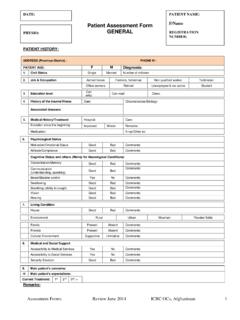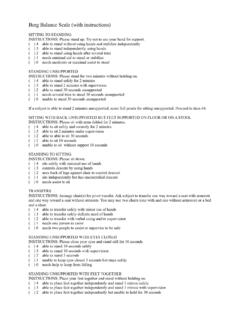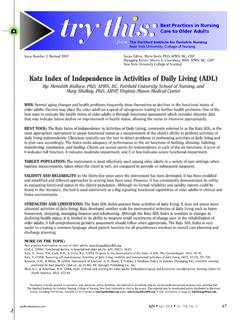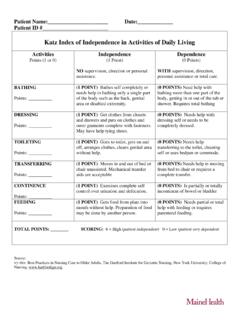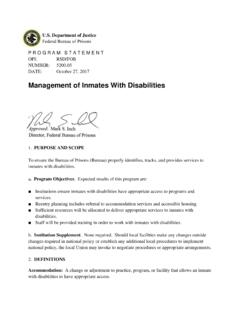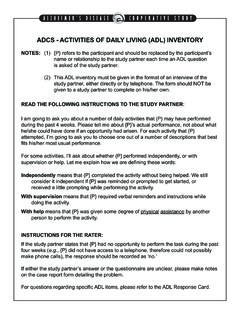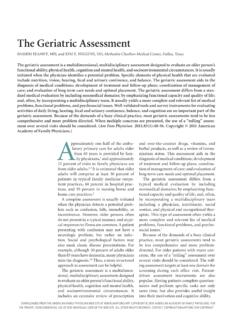Transcription of Bristol Activities of Daily Living Scale - Physiopedia
1 Bristol Activities of Daily Living Scale Bucks, R. S., Ashworth, D. L., Wilcock, G. K., and Siegfried, K. (1996) Bristol Activities of Daily Living Scale Name of patient:.. Patient number: Carer s Name:.. Assessment date: ../../.. Relationship:.. This questionnaire is designed to reveal the everyday ability of people who have memory difficulties of one form or another. For each activity (No. 1 - 20), statements a - e refer to a different level of ability. Thinking of the last 2 weeks, tick the box that represents your relative s/friend s AVERAGE ability. (If in doubt about which box to tick, choose the level of ability which represents their average performance over the last 2 Weeks.)
2 Tick Not applicable if your relative never did that activity when they were well). 1. PREPARING FOOD a) Selects and prepares food as required b) Able to prepare food if ingredients set out c) Can prepare food if prompted step by step d) Unable to prepare food even with prompting and supervision e) Not applicable 2. EATING a) Eats appropriately using correct cutlery b) Eats appropriately if food made manageable and /or uses spoon c) Uses fingers to eat food d) Needs to be fed e) Not applicable 3. PREPARING DRINK a) Selects and prepares drinks as required b) Can prepare drinks if ingredients left available c) Can prepare drinks if prompted step by step d) Unable to make a drink even with prompting and supervision e) Not applicable 4.
3 DRINKING a) Drinks appropriately b) Drinks appropriately with aids, beaker/straw etc. c) Does not drink appropriately even with aids but attempts to d) Has to have drinks administered (fed) e) Not applicable 5. DRESSING a) Selects appropriate clothing and dresses self b) Puts clothes on in wrong order and /or back to front and /or dirty clothing c) Unable to dress self but moves limbs to assist d) Unable to assist and requires total dressing e) Not applicable 6. HYGIENE a) Washes regularly and independently b) Can wash self if given soap, flannel, towel, etc. c) Can wash self if prompted and supervised d) Unable to wash self and needs full assistance e) Not applicable 7.
4 TEETH a) Cleans own teeth/dentures regularly and independently b) Cleans teeth/dentures if given appropriate items c) Requires some assistance, toothpaste on brush, brush to mouth etc d) Full assistance given e) Not applicable 8. BATH/ SHOWER a) Bathes regularly and independently b) Needs bath to be drawn/shower turned on but washes independently c) Needs supervision and prompting to wash d) Totally dependent, needs full assistance e) Not applicable 9. TOILET/ COMMODE a) Uses toilet appropriately when required b) Needs to be taken to the toilet and given assistance c) Incontinent of urine or faeces d) Incontinent of urine and faeces e) Not applicable 10.
5 TRANSFERS a) Can get in/out of chair unaided b) Can get into a chair but needs help to get out c) Needs help getting in and out of a chair d) Totally dependent on being put into and lifted from chair e) Not applicable 11. MOBILITY a) Walks independently b) Walks with assistance furniture, arm for support c) Uses aids to mobilise frame, sticks etc. d) Unable to walk e) Not applicable 12. ORIENTATION - TIME a) Fully orientated to time/day/date etc. b) Unaware of time/day etc but seems unconcerned c) Repeatedly asks the time/day/date d) Mixes up night and day e) Not applicable 13. ORIENTATION - SPACE a) Fully orientated to surroundings b) Orientated to familiar surroundings only c) Gets lost in home, needs reminding where bathroom is, etc.
6 D) Does not recognise home as own and attempts to leave e) Not applicable 14. COMMUNICATION a) Able to hold appropriate conversation b) Shows understanding and attempts to respond verbally with gestures c) Can make self understood but difficulty understanding others d) Does not respond to, or communicate with others e) Not applicable 15. TELEPHONE a) Uses telephone appropriately, including obtaining correct number b) Uses telephone if number given verbally/visually or predialled c) Answers telephone but does not make calls d) Unable/unwilling to use telephone at all e) Not applicable 16 HOUSEWORK / GARDENING a) Able to do housework/gardening to previous standard b) Able to do housework/gardening but not to previous standard c) Limited participation with a lot of supervision d) Unwilling/unable to participate in previous Activities e) Not applicable 17.
7 SHOPPING a) Shops to previous standard b) Only able to shop for 1 or 2 items with or without a list c) Unable to shop alone, but participates when accompanied d) Unable to participate in shopping even when accompanied e) Not applicable 18. FINANCES a) Responsible for own finances at previous level b) Unable to write cheque. Can sign name & recognises money values c) Can sign name but unable to recognise money values d) Unable to sign name or recognise money values e) Not applicable 19. GAMES /HOBBIES a) Participates in pastimes/ Activities to previous standard b) Participates but needs instruction/supervision c) Reluctant to join in, very slow needs coaxing d) No longer able or willing to join in e) Not applicable 20.
8 TRANSPORT a) Able to drive, cycle or use public transport independently b) Unable to drive but uses public transport or bike etc. c) Unable to use public transport alone d) Unable/unwilling to use transport even when accompanied e) Not applicable Vertaling: Bristol Activities of Daily Living Scale Bucks, , Ashworth, D. L., Wilcock, G. K., and Siegfried, K. (1996) Bristol Activities of Daily Living Scale Naam van de pati nt :.. Naam van de beoordelaar:.. Datum van de evaluatie: ../../.. Deze vragenlijst werd ontworpen om na te gaan in hoever personen met geheugenproblemen bekwaam zijn om activiteiten van het dagelijks leven uit te voeren.
9 Bij elke activiteit (nr. 1 - 20) verwijzen de punten a tot e telkens naar een verschillend bekwaamheidsniveau. Om deze vragenlijst correct in te vullen, denkt u aan de bekwaamheid van uw ouder/ vriend/pati nt gedurende de voorbije 2 weken en kruist u het vakje aan dat het best zijn bekwaamheid weergeeft. (Indien u twijfelt, neemt u het bekwaamheidsniveau dat het gemiddelde van zijn prestaties weergeeft van de voorbije 2 weken. Kruis Niet van toepassing aan indien uw ouder deze activiteit voorheen nooit heeft uitgevoerd). 1. KOKEN a) Kiest en bereidt zelfstandig de gerechten b) Kan eten klaarmaken indien men hem de ingredi nten bezorgt c) Kan een maaltijd bereiden indien men hem stap voor stap aanwijzingen geeft d) Is niet in staat om een maaltijd te bereiden, zelfs niet na aandringen en onder toezicht e) Niet van toepassing 2.
10 ETEN a) Eet correct en gebruikt bestek op de juiste manier b) Eet op gepaste wijze indien het voedsel werd gesneden en/of gebruikt een lepel c) Eet met de vingers d) Moet worden gevoed e) Niet van toepassing 3. DRINKEN KLAARMAKEN a) Kan zelfstandig dranken kiezen en bereiden b) Kan dranken bereiden indien men hem de ingredi nten bezorgt c) Kan dranken bereiden indien men hem stap voor stap aanwijzingen geeft d) Is niet in staat om dranken te bereiden, zelfs niet na aandringen en onder toezicht e) Niet van toepassing 4. DRINKEN a) Drinkt op gepaste wijze b) Drinkt op gepaste wijze en gebruikt hulpmiddelen (rietje, drinknap.

